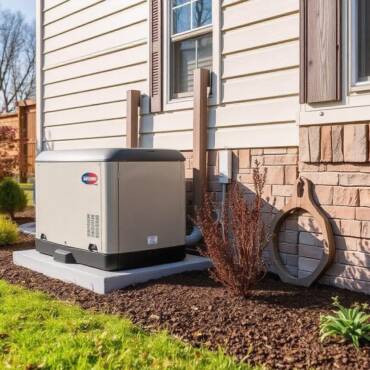Investing in any electrician generator installation project is a significant undertaking that requires a collaborative effort between homeowners and electricians. The process involves logistical proficiency to make sure your generator is safe and efficient during operation.
For electricians, an assessment usually includes a handful of technical reviews on specific areas of your home’s electrical panel and network. Your installer will evaluate the home’s electrical panel to determine if the existing circuit breaker box can accommodate your desired generator’s output.
Developing a wiring plan for connecting the generator to the home’s electrical load center is a key element of setting up any system. Additionally, strategically choosing the appropriate transfer switch and other necessary components is all part of the process.
Only then can your electrician install the piping for your fuel source, whether it’s natural gas or liquid propane. One of the greatest features of your generator is: it automatically switches your home’s power source to the generator during a blackout. That’s why your electrician will ensure proper grounding to protect against electrical shock.
Part of this insurance is testing the generator and verifying that it can power each circuit it’s connected to. Simulating a power outage will take priority at the end of your installation, as the electrician tests the automatic transfer switch to ensure it functions correctly.
Overall, the specialized complexity of any residential generator installation job for electricians depends on the specific system and the electrician’s experience. It involves:
- Electrical knowledge. Understanding electrical codes, wiring diagrams, and safety protocols.
- Generator expertise. Familiarity with different generator types, capacities, and installation requirements.
- Problem-solving skills. Resolving potential issues like incorrect wiring, inadequate grounding, or insufficient fuel supply.
Educating the customer is the final step. Explaining the generator’s operation, maintenance requirements, and safety procedures is a momentous experience for any household.
Take Good Notes on Your Electrician Generator Installation Day
By adopting a proactive approach to learning as much as you can during your electrician generator installation, homeowners can gain a clear understanding of their new backup power system. This involves active listening.
Pay close attention to the electrician’s explanations, focusing on key points regarding your generator’s operation, maintenance, and safety features. Avoid any distractions so you can fully absorb the information, and take notes or ask the electrician for a written guide to refer back to later.
Above all, ask questions. Don’t hesitate to ask about anything that’s unclear or requires a better explanation. Seek clarification on technical terms or jargon to have a thorough understanding, and inquire about potential issues, troubleshooting tips, and recommended maintenance schedules.
Your hands-on learning opportunity will be key. Request a demonstration of how to start, stop, and operate the generator, and ask the electrician to walk you through the process of switching between grid power and generator power. Practice using the generator’s control panel, and get familiar with its functions.
Home-in on your safety instructions and guidelines. Ask about potential hazards associated with generator use and how to avoid them. Any homeowner should understand the importance of proper grounding, fuel storage, and ventilation.
If any questions arise after the electrician leaves, don’t hesitate to contact your personal professional or the dealership for clarification. Consider scheduling a follow-up visit or maintenance check to ensure the generator is functioning optimally.
What’s Easier and Better Today Versus the Past
Beyond the electrician generator installation specifics, owning a home backup generator today is significantly easier and more convenient than it was 20 or 30 years ago thanks to technological advancements and increased awareness. In the same respect, some fundamental aspects remain similar.
Here is what’s easier:
- Modern home backup generators come with automatic transfer switches that detect power outages and seamlessly switch to backup power, eliminating the need for manual intervention.
- Remote monitoring. Many generators now offer remote monitoring and control capabilities through smartphone apps, allowing homeowners to check the generator’s status, receive alerts, and start or stop it remotely.
- Fuel efficiency. Newer generators are designed to be more fuel-efficient, reducing operating costs.
- Quiet operation. Advances in technology have led to quieter generators, making them less disruptive to homeowners and their neighbors.
- Ease of installation. While professional installation is still recommended, some generators are now designed for easier do-it-yourself installation, minimizing costs and simplifying the process.
Here is what’s better:
- Increased awareness. With the growing frequency and intensity of extreme weather events, more homeowners are recognizing the importance of having a reliable backup power source.
- Wider availability. Home backup generators are widely available through various retailers, making them more accessible to consumers.
- Financing options. Many retailers and manufacturers offer financing options, making generators more affordable for homeowners.
- Integration with smart-home technology. Some generators can be integrated with smart home systems, allowing for seamless control and automation alongside other home devices.
What’s the same? The need for a professional and qualified installation experience. Owning a home backup generator today is more convenient and user-friendly than it was in the past.
With that said, the fundamental principles still remain the same, especially when it comes to sophisticated installation methods and techniques.
Electrician Generator Installation and Home Energy Use
Beyond the expertise, any electrician generator installation specialist is usually a pro in end-use energy consumption by household type. Space heating and water heating are the dominant energy uses in homes, accounting for 65 percent of total household energy consumption. The primary fuels used for these purposes are natural gas (49 percent), electricity (37 percent), and fuel oil (8 percent), according to the U.S. Energy Information Administration.
“Other end uses, such as air conditioning, refrigerators, lighting, and electronics, make up the remaining 35 percent of household energy consumption,” the agency states. “The data for this analysis is sourced from the EIA’s 2015 Residential Energy Consumption Survey, which provides a comprehensive overview of residential energy usage in the United States.”
The agency’s survey results include consumption and cost estimates for 26 electricity, seven natural gas, five propane, and three fuel-oil household energy end-use categories. These detailed estimates offer valuable insights into household energy use, informing policy decisions, energy efficiency initiatives, and consumer choices.
The 2015 survey reveals some interesting trends on:
- Major energy consumers. Space heating (41 percent) and water heating (18 percent) account for the largest share of household energy consumption.
- Fuel preferences. Natural gas is the most common fuel for heating (49 percent), followed by electricity (37 percent) and fuel oil (8 percent).
- Appliance usage. Refrigerators and clothes dryers are among the most energy-intensive appliances, while lighting and electronics account for a smaller portion of consumption.
- Regional variations. Energy consumption patterns vary by region, with colder climates using more energy for heating and warmer climates using more for air conditioning.
- Expenditure trends. Households spend more on fuels like natural gas and fuel oil compared to electricity, reflecting price differences and consumption patterns.
- Efficiency opportunities. There is potential for significant energy savings through improved insulation and more efficient appliances.
Installation is a Mastered Science and Takes Engineering
Electrician generator installation dealerships have mastered the science and engineering behind attaching whole-house generators to homes. It’s important to choose a qualified, experienced professional to install such a complex piece of equipment. Proper installation is crucial for the safety and efficient operation of any generator.
First, consider using a Generac generator dealership locator, an online tool enabling users to search for certified dealers. This tool streamlines the process of finding authorized professionals who have met Generac’s stringent standards.
Through this process, you’ll find a local electrician. This type of skilled professional has the necessary qualifications to install Generac generators. For homeowners who already have an established relationship with a trustworthy electrician, that may also be a convenient option.
Conducting due diligence before hiring an installer is important. Obtain references from potential installers and verify credentials. Also, do your research so you can prepare for the generator installation process, such as clearing the designated installation area and obtaining any necessary permits.
“Even if you are comfortable doing your own electrical work, there are times when you will want to hire an electrician,” says The Spruce. “Professionals are trained and licensed, plus they do this work every day. Projects that require a steep learning curve for you are second nature to them.”
While it’s generally legal for homeowners to complete their own electrical work, certain conditions may apply. The importance of safety when undertaking electrical work cannot be understated, as mistakes can be dangerous or even fatal. Carefully consider the skill level and knowledge of electrical codes before attempting any repairs.
Nonetheless, homeowners can confidently navigate the process of finding a qualified Generac generator installer and ensure that the investment is installed correctly. This meticulous approach will maximize your generator’s performance and guarantee the wellbeing of your household.
Danley Electrical
At Danley 911 Home Services Electrical, we help you execute the electrician generator installation process from beginning to end. We prepare you for your installation, as well as obtaining permits, inspections, and assisting with repair and maintenance. We also help you optimize and fine-tune your situation to determine the correct generator size.
Get the most out of your investment. Contact us today.



